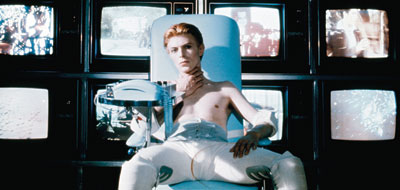GOOD TIMING
BY SCOTT MACAULAY
 |
| David Bowie in Nicolas Roeg’s The Man Who Fell to Earth. |
Among American independents, the movies of a group of ’70s american auteurs — the “easy riders, raging bulls” of Peter Biskind’s book of the same name — hold a privileged place in recent film history. The studio-supported work of Hal Ashby, Bob Rafelson, Martin Scorsese, etc., are seen as more astutely connected to the zeitgeist of their times than the films of many of today’s filmmakers are to ours. However, no assessment of cinema in the ’70s, no reconciling of that social era with the films of the time, can be complete without considering the work of Nicolas Roeg, the British director who began his career as a d.p. in 1947 and directed a remarkable string of great films throughout the decade: Performance (1970), Walkabout (1971), Don’t Look Now (1973), The Man Who Fell to Earth (1976) and Bad Timing (1980), the latter two just released in deluxe new Criterion DVD editions. In fact, re-watching Roeg’s films again recently, with their free-associative editing, restless camera eyes, dense musical collages and deeply inquisitive engagement with the world around us, they seem, to me at least, some of the important films of the era.
On the commentary track for The Man Who Fell to Earth, based on the science-fiction novel by Walter Tevis, Roeg jokes that he still doesn’t understand how he was able to get the money to make such a “weird movie.” (Financier Donald Rugoff actually said, in fact, “It was one of the weirdest films I’ve ever seen,” before consulting a psychiatry professor and some college students and cutting 20 minutes for the American release.) Today, the film feels not weird at all; it’s a colorful, witty, sometimes deeply sad but always humane meditation on America and modern-day capitalism. The story is simple: Thomas Newton, played to perfection by David Bowie in his visually resplendent “Thin White Duke”/Station to Station phase, devises nine patents — including a precursor to digital photography — and, with the help of a patent lawyer played by Buck Henry, a ditzy girlfriend (Candy Clark) and a burnt-out college professor (Rip Torn) as his scientific adviser, becomes a Howard Hughes–like billionaire. But when Newton becomes simply too powerful, he is captured by the government, which wrests control of his empire from him. At the film’s end, Newton is an alcoholic and minor recording artist whose dreams have been squashed by those in power.
What’s science fiction about the story? One detail: Bowie is an alien who has traveled to earth to devise a way to save his family, who are dying because of a planetary drought. And while the science fiction concept gives the film its kicky surrealism and encodes its social commentary, Roeg’s eyes and ears are firmly fixated on the peculiar rhythms of American life as he uses his jump cuts, flash forwards and backwards, quick zooms and match cuts to capture the effect of commodity culture on the very real humans who populate the film’s beautifully art-directed mise-en-scène.
For me, Bad Timing, Roeg’s tale of erotic obsession starring Art Garfunkel and his wife, the actress Theresa Russell, has always been less of an unqualified success. Two Americans in Vienna — one, Alex, a calm and controlled psychoanalyst and university professor (Garfunkel); the other, Milena, a teasing, tempestuous object of desire (Russell) — engage in a wild affair, an amour fou framed, disturbingly, by a police investigation surrounding Milena’s suicide attempt. Screenwriter Yale Udoff said that he wanted the film to be “Antonioni with humor,” but Roeg’s finished piece is not funny at all. It’s queasily disorienting, a film that feels like a hangover in which the good times are only hazily remembered.
Seen, however, 25 years after its release and in comparison to Kubrick’s Eyes Wide Shut, which also invoked the Vienna of Sigmund Freud (that movie was based on Arthur Schnitzler’s Vienna-set novel Traumnovelle), Bad Timing seems the more truthful take on sexual obsession and the question of how much we can ever really know about a partner in a relationship.
Roeg would go on to make many other features, but the ’70s were his time. Later work, such as the Mimi Rogers starrer Full Body Massage and the peculiarly named short The Sound of Claudia Schiffer, saw Roeg falling into his own form of erotic torment as financiers seized on his ability to create jazzy images while ignoring the deep human dramas and social critiques contained in his films. For now, though, these Criterion disks are essential viewing for a generation of ’70s-inspired indies whose films need to take note of his considerable achievements.
VOD CALENDAR


 See the VOD Calendar →
See the VOD Calendar →


